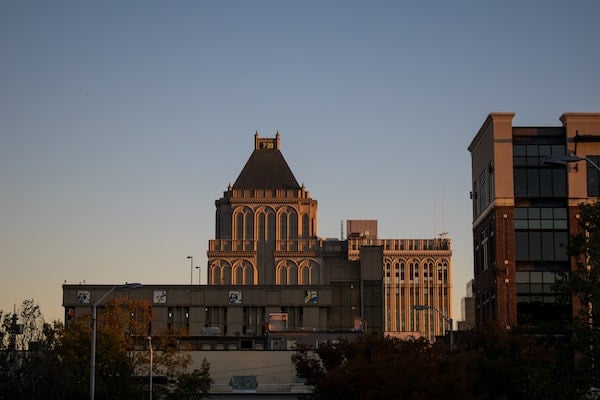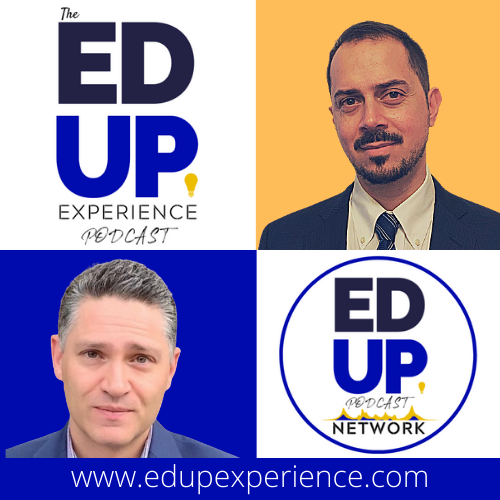Published on
Professional & Continuing Ed and DE&I in Higher Education

Higher education serves a wide variety of audiences but hasn’t always delivered equal opportunity to both faculty and students. Now more than ever, institutions and industry are beginning to work toward a more diverse and equitable society, but there is still some work to be done. In this interview, Dr. Joe Sallustio speaks with Mayen Udoetuk to discuss the importance of partnerships, creating meaningful ways to establish more diversity, equity and inclusion and why this topic isn’t going away.
EdUp Experience: Are you seeing a change in how you’re developing partnerships?
Mayen Udoetuk (MU): We are. We’ve actually been able to expand who we work with in terms of having a more global reach. Since everything is online, we’ve been more agile when it comes to who we can partner with, whether or not their curriculum already exists online. It’s been helpful to get out there and talking with different people. It’s really a two-way effort. Some organizations find us to partner, and we go out and seek people as well.
EdUp Experience: In terms combining upskilling and reskilling with partnerships, how can we create meaningful and measurable ways to create more diversity when hiring candidates?
MU: Thankfully, there’s not just talk but some action as well. When I look at Silicon Valley in general and at the different tech companies based there, there’s a lot that different organizations are doing to improve diversity, equity and inclusion within their staff. And even within leadership in the C-suite level. We’re taking on different initiatives for Silicon Valley Extension of the UC of Santa Cruz. I can’t help but to look into my experience as a Black woman with a first career in chemistry before transitioning to educational psychology. I can’t help but to utilize that and have that be a huge driving force in making sure we offer always have some type of initiative cemented in diversity, equity and inclusion.
I don’t want to just stop at our academic offerings—I’ve also had conversations with our dean about the diversity of our staff, including our Extension staff, advisory board members and instructors. So, part of my role as the director of program and partnering development is to continue building and refining our advisory boards. Part of my responsibility is making sure that not only am I furthering their growth or making sure that we have the right subject matter experts to help craft curriculum in those academic domains. But it is very important to me to ensure we have representation for marginalized groups on that board, on each board. As we’ve seen from the research when you have a more diverse pool of voices, we can really increase our success rates from just verbalized goals to actual, tangible goals exemplified in our community.
EdUp Experience: What strategies would you suggest for schools looking to make change as far as that area in our sector?
MU: Some of them are easier said than done to be honest. But when it comes to having increased diversity, equity and inclusion at the leadership level, a lot of it has to do with the leaders already in place who need to take all of the different aspects of diversity, equity and inclusion seriously. And identifying who’s currently available with internal hires, just in case there are some issues with hiring externally, challenging the notion that there isn’t enough talent within diverse pools.
EdUp Experience: Is there a need and a desire for the DE&I curriculum?
MU: From my point of view and perspective, the answer is unequivocally yes. There is a need, a need at different levels. Customizing that training is something that myself and my colleagues are working on at Extension. We want to be a provider of curriculum, so we can either go to the students or have the students come to us. We want to be able to customize as much as we can to best suit the needs of the company we’re servicing.
There are some very serious repercussions that are there just waiting when diversity, equity and inclusion training isn’t handled the way it should be. It’s a pitfall that can be avoided with the right training. There’s a sense of urgency on the extension’s behalf to go ahead and provide this training as soon as possible. Some organizations may not have the bandwidth to create it themselves or are looking for something to supplement. We want to be a provider for that.
EdUp Experience: Is this something that you think will lose momentum?
MU: I don’t think it’s going away. That was actually the same question that posed quite some time back when STEM made a big splash on the scene. Now it’s known as STEAM since they added the arts. So, like STEM and STEAM, I don’t think that DE&I is going away.
We’re going to see an even stronger need for it, especially depending on the administration we have. If we’re going to be in a society in which many citizens emboldened to violence and racism, sexism, bigotry, all of these negativisms, of course these same people work for organizations and that behavior, as we’ve been seeing, is being brought to work. And there are some real repercussions and consequences when that behavior is at work because there are certain rules and laws and policies in place to protect individual employees from that type of behavior.
Maybe different aspects of DE&I will have be spotlit. There may be different aspects of DE&I that rise volume where others lower. But I don’t think any one issue is going to stay low for too long. Marginalized groups in this country, to put it plainly, we’re not having it anymore. There’s no reason for it.
EdUp Experience: What’s the sense that you’re getting as far as people feeling maybe afraid of stepping into DE&I and those kinds of initiatives?
MU: Thankfully so far, I have yet to hear any organization with whom we’re exploring a partnership say that they don’t think DE&I is important. I would say that some organizations have a very carved out profile when it comes to what they offer, and sometimes it has nothing to do with DE&I. And that I can respect. But then other organizations do see that DE&I is very much built into what they do, so they’re trying to integrate more training into it.
The psychologist in me wants to remind us all that as long as humans have been on this planet, until something changes, there’s always an in-group and out-group. So, I think that’s another reason that DE&I won’t go away. We might see additional aspects and categories added to it, but there’s always some in groups and some out group and that’s going to give way to prejudice, bigotry and discrimination in both the workplace and personal life.
EdUp Experience: Is there anything you’d like to add?
MU: The University of California Santa Cruz Silicon Valley Extension is still here. We are still waiting for all these opportunities to provide top-notch, cutting-edge training regarding engineering and technology, business and management, education, bio, science, design and diversity, equity and inclusion. We are always looking for instructors to teach. We are also always looking for folks who already have curriculums that we could license and offer to our students. We’re always looking for members of community to be members or our advisory boards. So, if any of that sounds interesting and you have the bandwidth to do that, please reach out to me on LinkedIn. That would be great. We are building out teams. We want to make sure that whatever different workforces need, we are providing them with the adequate training for re-skilling and up-skilling.
EdUp Experience: What does the future of higher education look like?
MU: There’s a lot of resistance to how education is changing. But there’s excitement for what we can stand to do. The pandemic has smacked higher education in the face with the realities of so many things. For example, everything transitioning to online has really brought to light some issues with access. We can’t just assume that every faculty, staff member and student has adequate internet access. Adequate access to updated laptops and computers and software and tools. When I think of the future of higher education, equity is going to be huge.
I also think about how agile we will have to be. Higher education is going to have to learn to disrupt itself. We can no longer sit and wait for outside industries to disrupt us. We’re going to have to do that because the pandemic has already disrupted us. We have to be innovative and do so quickly.
Fail fast, try many different things because that will push you closer to what will work. The future will see a strong adherence hopefully to diversity, equity and inclusion in every single category, up and down the career ladders in higher education and all throughout the student body.
And lastly, I get excited in terms of the different things that education will be able to do. They were put on the planet for a specific demographic, if we’re being honest, but we want more people to engage in critical thinking. I’m hoping that the future of higher education will see positive results when it comes to diversity, equity and inclusion as well as in environmental sustainability and the health.
This interview was edited for length and clarity.
Listen to the full interview here.




